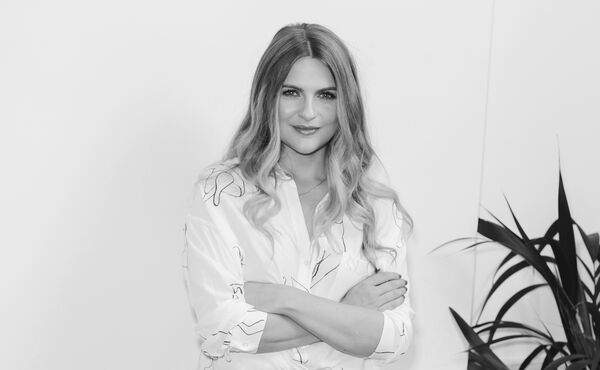Mo Gawdat is on a mission to help make 1 billion people happy, but the former chief business officer at Google turned happiness guru and author’s mission comes from a place of grief that he managed to turn into purpose.
“I never chose the mission, the mission chose me,” says the man with the goal to help the world experience true happiness. Sadly, Mo lost his 21-year-old son in 2014, “It was due to an unexpected human error in a very simple surgical operation that Ali left our world.”
But in his short lifetime, Mo’s son taught him a lot. “Ali was more than a son to me, he was my friend, he was my coach, he was very, very wise and he taught me almost everything I know about happiness.”
Mo’s Mission
“Two weeks before [Ali] died, he had a dream and he told his sister he was everywhere and part of everyone.
“My unusual businessman’s mind heard that as a target… At Google, everything is in the billions, and I said ‘Okay my son, I will make that happen, I will make you everywhere and part of everyone just by spreading your message of happiness and how you lived’.”
Within 17 days of Ali’s passing, Mo found himself putting pen to paper, almost frantically, to document everything Ali had taught him about happiness. “They say that we somehow know why we are here and when we have achieved our mission we leave. I feel Ali was here to teach me and make me love him so much so, that when he left, I got the spark to do what I do.”
Many might wonder how Mo had the strength to keep moving, let alone start a global mission. “I think with an understanding of what death really is, grief becomes very different. If you understand death the way I understand it, which is there is a physical form to us, and there is a spiritual form to us. What dies is our physical form, our spiritual form is everlasting - if you think of it this way, why grieve? Why not celebrate that he was liberated to be in his real essence where, one day, I will join him? Eventually me and Ali will be in the same form once again. I wanted to share my wonderful son with the world. He was such a blessing, a gift, that I selfishly kept to myself for 21 years. Of course, I grieved, I still feel the pain today but not in the typical way, my grief turned into energy and that energy turned into happiness for others.”
For Mo, this mission isn’t about fame or fortune, it’s about helping people feel good deep down, every day. “I don’t think I’m important…but the mission is. And I think the mission to make a billion happy in this world that we live in is something that’s worth the pain of missing my wonderful son. I think a thing of this magnitude - the mission of making 1 billion people happy - happens through us. The universe or God, whichever you want to believe in, wants this to happen and I am the tool. I didn’t choose to do this but sometimes we get chosen.”
.jpg?sw=600&sh=370&sm=fit&cx=0&cy=0&cw=730&ch=450&sfrm=jpg)
Happiness is simple
As part of his goal to make 1 billion people happy, Mo wrote a book – Solve for Happy, which takes his logical science and business brain and applies it to happiness, something many of us see as this abstract thing that we can’t quite grasp what exactly it is or hold on to it for long enough. Happiness, for many, is a confusing and elusive emotion one that we experience fleetingly every now and then but can’t seem to grasp and keep hold of. It’s the one emotion that many of us are on a quest to find and sustain through milestones like bagging that dream job, finding your soul mate or starting a family. The quest to define what happiness is spans centuries and has preoccupied many of humanity’s greatest thinkers. Search for “happiness” online, and it’s hard not to get lost in the sea of results. You’ll find millions of definitions, exercises and input from the world’s top scientists, philosophers, and even economists. And yet, much of it appears contradictory. Many believe happiness is bound to material success, and yet there are people in the world’s least affluent countries that report higher levels of satisfaction with their lives. The digital age has made our day-to-day easier with everything, from dinner to movies accessible at the tap of a button or the swipe of a screen, and yet we’re constantly being told to unplug in our quest to find more joy.
Can we let you in on a secret? Happiness is actually the simplest emotion of all and the secret to being happy every day is as easy as pressing reset on your mindset.
Happiness is your default state.
Our default state
Happiness is our first emotion, Mo explains in his book. Think of it: one of the earliest developmental milestones we have as babies is smiling. One of the very first ways we express ourselves, when we’re not signaling that we’re in need of sleep or food or a cuddle, is through the coos of joy and laughter. If a child’s basic needs are accounted for, if they are fed and clothed and loved, they are happy. It is only as we grow and begin to absorb and internalise rules and expectations from the world around us, that we discover unhappiness beyond those basic needs.
The happiness equation
The simple fact is that ‘you feel happy when life behaves the way you want it to,’ writes Mo Gawdat in Solve for Happy. Unsurprisingly, the opposite is also true, ‘unhappiness happens when your reality does not match your hopes and expectations,’ he adds. For example, Mo explains that ‘when you expect sunshine on your wedding day, an unexpected rain represents a cosmic betrayal. Your unhappiness at that betrayal might linger forever, waiting to be relived anytime you feel blue or hostile toward your spouse: “I should have known! It rained on our wedding day!”.’
Happiness is a thought
In reality, it’s not the event that makes us unhappy, it’s the way we think about it that does. Let that sink in. Your happiness is all in your perception, and the key is to focus on positive thoughts. Yes, it might rain on your wedding day but that doesn’t change the fact that you’re marrying the person you love. That is what makes it a wonderful day, not the weather.
You might go to the hairdressers with a new style in mind but the result may not match your expectation. That doesn’t mean it’s a bad haircut, it’s just not what you expected. You can either dwell on what could have been or embrace your new ‘do. Again, your happiness is dependent on your thoughts.
Mo’s simple guide to happiness
Mo’s happiness model is very straightforward: Be, Learn, Do. Be is an awareness of something that you need to do; Learn is discovering what it is that you need to know; Do is that repeated practice so that it sticks and becomes part of your lifestyle.
Here are three happiness habits Mo leans on in daily life:
Make mornings yours
“Morning is when I spend time with me,” says Mo. “And, over time, I started to like me.”
Mo has a set morning routine that he enjoys. “When I wake up, I stretch [for 10-15 minutes] and make sure there are no pains or aches or any discomforts. I then have a coffee… I reflect very deeply on what coffee I’m in the mood for, I make it very deliberately and I sip it slowly.”
After this, Mo spends 25 minutes in complete silence. “It is not meditation… silence to me is not attempting to silence your brain, it is actually attempting to analytically listen to your brain without the emotions that make us feel negative. So, when my brain is done with what it wants to say, it’s total silence, it just goes into that bliss, heaven, really.”
Silence your Becky
We all have that inner critic, “it worries us about what is yet to come; it belittles us; it disciplines us; it argues, fights, debates, criticises, compares, and rarely ever stops to take a breath,” says Mo. How can we deal with such a powerful voice? Mo suggests giving your inner critic a name, he calls his Becky as this solidifies the fact that the voice is not you. It will never go away, so the best thing you can do is learn to demand more from your inner critic. Often what's being said isn’t productive, so every time they say something cruel ask them for a kinder or more useful thought. Be demanding! Train yourself every day to demand each negative thought be replaced with at least two positives. It takes practice to chip away at the negativity bias, but over time you will be amazed by the impact this can have on your emotional wellbeing.
Be outwardly grateful
Being grateful is contagious, in a good way! It can help build mutual feelings of trust and admiration. Tell your partner, parent, friend or colleague that you are grateful for them, try to be specific and tell them what it is that they have said or done that you are especially grateful for. It will be a little gift of happiness that is guaranteed to make them smile.
Want to know more about joy? Our first ever book, The Book of Rituals, delves deep into this topic and so much more. Featuring inspirational articles, unique art work and wellbeing wisdom, this luxurious coffee table book is the ultimate guide to soulful living. Click here to shop The Book of Rituals.




.jpg?sw=600&sh=370&sm=fit&cx=471&cy=0&cw=722&ch=445&sfrm=jpg)



